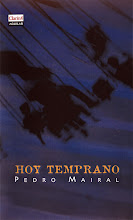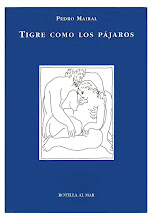Profile
Pedro Mairal
‘It’s more than even I imagined’
By Catherine Kirby
For the Herald
Pedro Mairal is still getting used to being recognized in the street. “It is a bit like a dream.” He says. “Much more than I could have wished for or imagined”. And his imagination –he admits it- is very good.
The unimaginable event for Mairal was winning Clarin’s 1998 annual competition for novels, entered this year by the authors of 734 unpublished manuscripts, and with three heavyweight novelists on the panel: Adolfo Bioy Casares, Augusto Roa Bastos and Guillermo Cabrera Infante. And thus becoming front-page news for Argentina’s top-selling daily newspaper.
We met in Pedro’s Barrio Norte apartment, which was quiet, despite being near Las Heras Avenue. In person he looks younger than his 28 years and rather less serious than in the picture here and the one inside the front flap of his winning novel Una noche con Sabrina Love -A Night with Sabrina Love. Slight of figure and soft in speech Mairal has something of the innocence, freshness and candour of his novel’s central character, Daniel.
Yet he is assured and at ease when talking of his trade, and he seems to enjoy concocting metaphors which later on will look good when written down on paper.
“I’ve been writing now for some ten years, short stories and poems,” he said. “I had one book of poems published in 1996, Tigre como los pájaros. When I began my next piece of writing I thought it would be a long short story. Half way through I realized it was turning into a novel. That scared me, but by then there was no going back. It was like swimming across a river: halfway, you realize it’s wider than you thought, but you have to get across.”
Right now Pedro continues to run writers’ workshops at home and at the Universidad del Salvador, where he needs to pass a couple more exams for his degree in literature, and where he works as an assistant teacher.
His career as a writer began with a mistake. After graduating from St.Andrew’s Scots School, he decided to study medicine. Then he started failing at every subject: biology, chemestry, maths. “I was too scared to tell my parents,” he said. “So I’d pretend I was still at University, but instead I’d go to a bar with lots of books and read. Then bit by bit I started writing... I needed to express what was going through my head. I realized that, in some way, poetry and literature were completing me. As a late-spring adolescent, I still felt rather incomplete, lost. That world started helping me tie those lost threads of my personality. ‘It’ found me and I found myself. So at around 21 I began studying literature at the University. A teacher can’t teach you to write, but you learn to become a better reader, to look for what an author does: it’s like turning over a tapestry and seeing where all the knots lie.”
The day after Una noche con Sabrina Love was announced as the winning novel, Pedro was invited to become involved en the cover design and publishing details that led to joint publishers Clarín-Aguilar’s first 20,000 copies of his story. The story of 17 -year- old Daniel from the fictitious town of Curuguazú in Entre Ríos, who finds he has won a competition to spend one night with Sabrina Love, the porn star of an X-rated TV programme. Obstacles in the way of his collecting his prize include floods surrounding his home town and above all his lack of experience in coping with the big city challenges posed by Buenos Aires. In every sense, then, it becomes an initiation.
“I loved the combination of the two themes, my love of travelling by road (“ruta No.14”) and the erotic –not eroticism for its own sake but as a celebration of life. My character leaves his hometown moved in this case by Eros, who the Greeks thought of as “the god who gets things moving. And just as this sent my character on his way, in turn it took me on my way to writing this story. It’s not a soul-searching, philosophical story, just a simple narrative, where my characters have things happen to them. It has something of the poetic, the lyrical in it, some colloquial dialogue... it is visual, it involves all five senses, so readers can almost say they experienced the story, they fill in the empty spaces I’ve left out. I’m no great character drawer –at least not yet!”
Pedro admits he’s been enjoying all the attention. It may take up a lot of his time, but the media attention has been a big learning experience for him, and any way he is sanguine and skeptical enough to believe that it is only likely to happen to him once. From the quiet creature in a corner inmmersed in writing his story, he then emerged into the public glare. The response to his book went beyond his dreams. Or was he really dreaming when Bioy Casares said to him: “I began reading your novel and I couldn’t put it down.”
Mairal reflects as only a good writer can on his own recent past. “My novel was written with no expectations, irresponsibly. Quietly. Then it made its own way, the judges liked it, and from now on things will change me, or my writing.”
Announcing literary aims is one thing. Being able to achieve them is another. And remembering his novel while listening to him talk, you can see how he has been able to fit the action to the word. “You need to know where you’re going,” he says. And as though he’d taken Eliot’s phrase, “In my end is my beggining,” as a precept, he adds: “I like to know where my hero is heading, the goal. Because the end is actually implicit, hidden in the first lines. When you’ve read the whole story, you understand why the first paragraph was written as it was.”
Unlike a novel whose outcome is known to the author, the future events in any human life are full of imponderables. But by now, Pedro Mairal, has undeniably got off to an extremely promising start.





